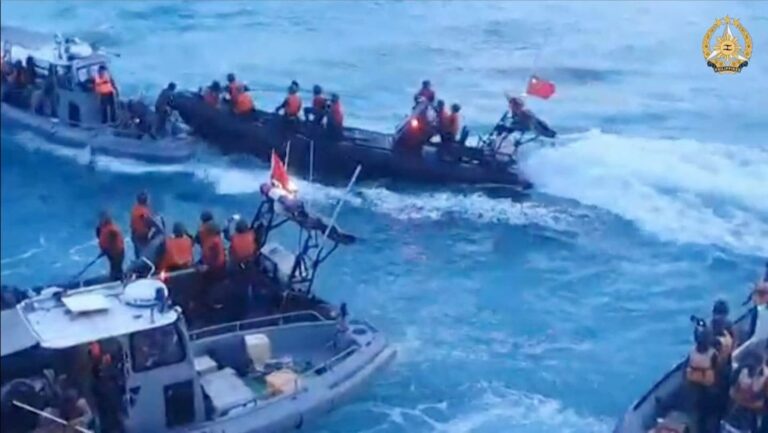The drills, which will take place in disputed waters that Manila claims as the West Philippine Sea, could also involve other U.S. allies such as Australia and Japan, U.S. officials said.
Philippine leaders have condemned China’s actions as “aggressive” and “illegal,” but have also recently sought to ease tensions over the disputed waters. “We are not in the business of instigating war,” Philippine President Ferdinand Marcos Jr. said Sunday after visiting soldiers wounded in a skirmish with China on the western island of Palawan.
Get caught up in
Stories to keep you up to date
U.S. Deputy Secretary of State Kurt Campbell said Monday that the Philippines was “being very cautious at this point” about the situation at sea. “They don’t want a crisis with China. They want a dialogue,” Campbell said at an event hosted by the Council on Foreign Relations in Washington. For the United States, “the most important thing at this time is to stand firm and express publicly and clearly our support for the Philippines,” he said.
China has recently been strengthening its presence in the South China Sea, which is claimed by six other countries.
Tensions escalated last week when a Chinese coast guard vessel rammed and boarded a Philippine Navy ship that was trying to resupply the Sierra Madre, a rusting warship that ran aground on a half-submerged reef known as Second Thomas Shoal. The collision seriously injured one sailor and prompted calls for action from the United States, which has a mutual defense treaty with the Philippines.
Since the incident, U.S. officials at the “highest levels” have been discussing an appropriate response, said one of the Asia officials, who, like the others, spoke on the condition of anonymity because of the sensitivity of the issue. “Something has to be done,” said the official, who works on security issues. “Do you want to be involved in something that could get out of control? That’s a big factor.”
Daniel Kritenbrink, the U.S. Under Secretary of State for East Asian and Pacific Affairs, who visited waters off Vietnam over the weekend, called China’s actions at Second Thomas Shoal “highly destabilizing.”
A second US official said the “level of anxiety” over the issue among countries in the region was “very high” and that “China has miscalculated here.”
Campbell said U.S. authorities had filed a diplomatic protest with the Chinese government over the incident.
Chinese Foreign Ministry spokesperson Mao Ning asserted at a press conference on Monday that Second Thomas Shoal is Chinese territory. “Our message to the Philippines is very clear: stop your infringements and provocations,” she said.
Separate from the joint exercises with the United States, the Philippines plans to begin a resupply mission to the Sierra Madre mountain range as early as this week, U.S. and Philippine officials said, and U.S. officials are closely watching the progress.
In a policy change, the Philippines will now publicize resupply missions in advance, according to the National Maritime Council, an interagency body convened by President Marcos Jr. earlier this year to manage any disputes with China.
Richard Heydarian, a senior lecturer at the University of the Philippines Asia Center, called on the United States to “take steps to directly support” the resupply mission to Sierra Madre and to declare that any lethal attack on Philippine military personnel would be grounds for invoking the mutual defense treaty. There is a need to “restore some element of deterrence,” Heydarian said in an interview.
But any U.S. involvement in resupply missions to the Sierra Madre must be at the request of the Philippines, U.S. and Philippine officials said. While the U.S. has provided “technical and logistical” support in previous resupply missions, Manila has purposely not asked the U.S. to join in carrying out those missions, the senior Philippine official said. That policy has not changed after the recent incident at Second Thomas, the Philippine official said.
U.S. officials acknowledged this: “This operation is about demonstrating Philippine sovereignty,” a representative for the Indo-Pacific Command said. “Giving it over to the U.S. is not something the Philippines wants to do.”
Tan reported from Singapore. Nakashima reported from Washington.

